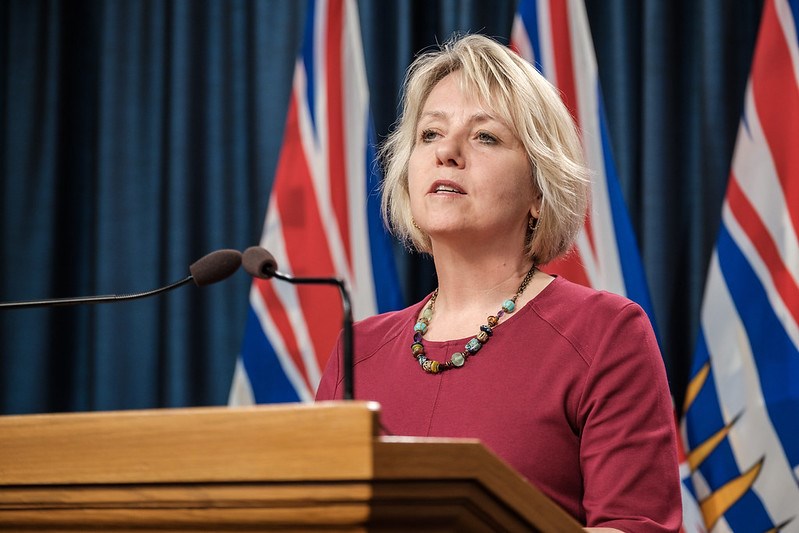B.C. recorded 1,158 new COVID-19 infections during the past three days, including 18 cases that were of the more easily transmitted variants.
The variant officially known as B.1.1.7, which was first detected in the U.K. is the more prevalent variant in B.C., with 12 new cases detected during the weekend. Four new cases of the B.1.351 variant, which was first discovered in South Africa, were discovered in B.C. in the past three days.
Almost 90%, or 61,117 people, are considered recovered out of the 67,937 people who have been infected with the virus since it first appeared in B.C. on January 28, 2020.
Some good news is that the number of people actively battling viral infections has dropped by 423 during the past three days, to 4,134 individuals. That is the lowest number of people actively fighting these infections since November 6, when 3,741 people had active infections.
The number of serious infections is also dropping, with three fewer people fighting COVID-19 in B.C. hospitals today than on January 29, when numbers were last released. There are now 289 people in B.C. hospitals, including 79 who are in intensive care units.
Unfortunately, 21 additional British Columbians have died from complications of the virus in the past three days. That brings the province's death toll from COVID-19 to 1,210.
Health officials are closely monitoring 7,234 people for symptoms because those individuals have had known exposure to identified cases.
Vaccinations are continuing with 9,651 completed in the past three days. That brings the total number of doses administered to 138,892, including first doses to 134,401 people and two doses to 4,491 people.
The breakdown of where the 1,158 new cases are located is as follows:
• 295 people in Vancouver Coastal Health (25.5%);
• 493 people in Fraser Health (42.6%);
• 78 in Island Health (6.7%);
• 194 in Interior Health (16.7%); and
• 98 in Northern Health (8.4%).
Outbreaks of the virus at Burnaby Hospital, and at Brookside Lodge seniors' home in Surrey are newly declared over.
There remain eight B.C. hospitals identified as having active COVID-19 outbreaks. They are:
• Cariboo Memorial Hospital in Williams Lake;
• Mount St. Joseph's Hospital in Vancouver;
• Nanaimo Regional General Hospital in Nanaimo;
• Royal Columbian Hospital in New Westminster;
• Royal Inland Hospital in Kamloops;
• St. Paul's Hospital in Vancouver;
• Surrey Memorial Hospital in Surrey; and
• University Hospital of Northern B.C. in Prince George.
COVID-19 outbreaks remain at 24 seniors' care homes, assisted-living facilities and retirement residences across the province.
The three active outbreaks at seniors' living facilities in Vancouver Coastal Health are at:
• Hilltop House in Squamish,
• Minoru Residence in Richmond; and
• Holy Family long-term care centre in Vancouver.
There are 12 active outbreaks at seniors' living facilities in Fraser Health. They are at:
• Bradley Centre in Chilliwack;
• Concord By the Sea in White Rock;
• Eagle Ridge Manor in Port Moody;
• Evergreen Baptist Care Society in White Rock;
• George Derby Centre in Burnaby;
• Glenwood Seniors Community in Agassiz;
• Hilton Villa Seniors Community in Surrey;
• Madison Care Centre in Coquitlam;
• Nicola Lodge in Port Coquitlam;
• Royal City Manor in New Westminster;
• St. Michael's Centre Extended Care in Burnaby; and
• Suncreek Village in Surrey.
The two active outbreaks at a seniors' living facilities in Northern Health are at Jubilee Lodge in Prince George, and Acropolis Manor in Prince Rupert.
The six active outbreaks at seniors' living facilities in Interior Health are at:
• Brocklehurst Gemstone Care Centre in Kamloops;
• Creekside Landing in Vernon;
• Heritage Retirement Residence in West Kelowna;
• Heritage Square in Vernon;
• Noric House in Vernon; and
• Sunnybank Retirement Home in Oliver.
The only outbreak at a seniors' facility in Island Health is at Chartwell Malaspina Care Residence in Nanaimo.
Henry provincial health officer Bonnie Henry said that small gatherings are partly to blame for the continued prevalence of new infections, particularly among young people.
"Where we're seeing transmission, in many of the communities is within young people," she said. "We know that that is linked to small social events that people are having. So it's not okay to have my one or two friends that I have dinner with tonight, or my one or two friends that I go with today, and then a different group tomorrow."



